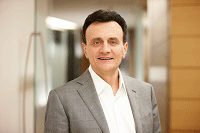 |
| AstraZeneca CEO Pascal Soriot |
AstraZeneca had a good weekend.
Investigators unveiled a promising early-stage look at its lung cancer drug, AZD9291, which inspired Leerink Swann's Seamus Fernandez to enthuse about its blockbuster potential and add $500 million to his peak sales model for the drug. And AstraZeneca ($AZN) followed up with an update on 9291 alongside MEDI4736 and its PARP inhibitor olaparib, the subject of a late-stage salvage operation after the drug earlier failed a key study.
That kind of news won't convince anyone that the troubled AstraZeneca is actually on the turnaround trail after years of mishaps, restructurings and deals gone awry. But it's a step in the right direction in what CEO Pascal Soriot--now celebrating his first anniversary on the job--promises will be a slow but steady reversal of its misfortunes.
Reuters' Ben Hirschler, who has followed the pharma giant longer than most, provided some muted applause for the progress to date, writing that the company's restive investors seem relatively content with Soriot's patient strategy. And one of the CEO's former colleagues at Roche ($RHHBY) added a modest compliment.
"I see him implementing some of the same strategies that have been adopted by Roche, in terms of focusing on highly innovative products and taking risks," said one senior Roche insider, according to Reuters. "You have to have patience when your company is going through these kinds of adjustments."
Hirschler didn't invite any company critics to Reuters' quiet party, which would not have been hard to do. Where Roche had Genentech to turn to after completing a buyout, AstraZeneca has so far avoided any such big acquisitions, hopeful that a resurgent MedImmune can help turn things around with an ambitious pipeline of new drugs as the European side regroups in Cambridge, U.K. Buying MedImmune was David Brennan's big idea, and its failure to pay off in the near term helped seal his fate.
What Soriot has done is spend about $2 billion on Omthera ($OMTH), Pearl and Amplimmune, which hasn't provided the kind of thrilling new breakthrough drug that can inspire belief in a revival.
"The M&A has looked okay, but it is still too early to say if it is really going to shore up the pipeline," a less-than-enthusiastic "leading investor" told Hirschler.
That's not what a CEO likes to see in print.
So it seems that Soriot will stick to the game plan: one step at a time, hopefully in the right direction. With Crestor losing patent protection in 2016, though, patience could be increasingly hard to come by. -- John Carroll, Editor-in-Chief. Follow me on Twitter and LinkedIn.